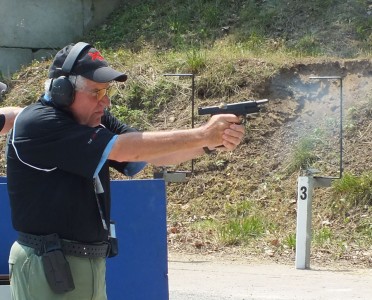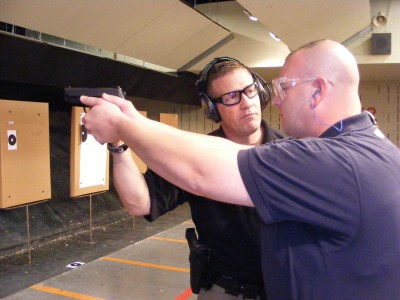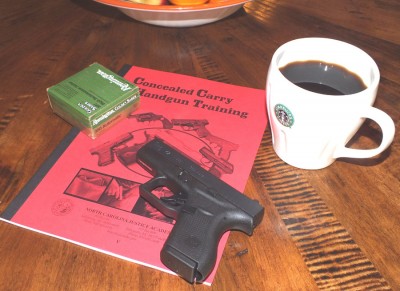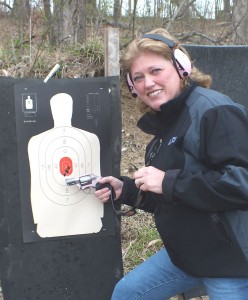
Practice can save your life: Competition can help you learn to manage pressure, improve your accuracy, and teach you to deal with malfunctions. If you feel nervous and don’t shoot as well as you thought you might in a match, imagine the pressure of a deadly force event.
Editor’s note: Dick Jones is a frequent contributor to GunsAmerica. He’s also recently authored Gun Digest’s Guide to Concealed Carry Handguns.
As a firearms instructor, Dick has given a lot of thought to the questions beginners often ask themselves. At GunsAmerica, we–the so-called-experts–often get lost in the intricate debates about caliber selection, or grip textures, and forget that we–all of us who know and love guns–are also ambassadors and educators.
Here’s Dick’s introductory lesson for those who are considering concealed carry–and for those who may need to reconsider their own habits. The views expressed are his. ~
#1 Now’s the time to get certified.
The face of gun ownership in America is changing. While there are no statistics to establish just how many new gun owners there are, anyone who works behind a gun counter will tell you the number is staggering and continuing to grow. Many of these people aren’t buying guns for hunting, competition, or as collectors. They’re buying guns for personal defense and signing up for the right to concealed carry. They’re doing this because they share the belief that an armed citizen is less likely to be a victim of a violent crime than an unarmed one. In some states over 10 percent of the population now has a concealed carry permit. While this is happening, long time gun owners who never considered everyday carry have begun carrying guns as part of their daily routines.
We may now have the highest percentage of citizens who are armed on a daily basis (at least since the beginning of the 20th century–maybe ever). In this burgeoning population of concealed carry citizens, it’s remarkable how few mistakes armed citizens make. During a recent internet search of newspaper and TV reports of incidents where concealed carry citizens wrongly used a gun as research for a book I was writing, I was hard pressed to find a single case of wrongdoing by licensed concealed carry citizen.
The message here is simple. If you haven’t gotten certified, now’s the time. Even if you don’t know if you would carry, or would even want to carry, you have the right to carry. You may bristle at the need for a piece of paper that allows you to exercise what is a Constitutional right. I understand that argument. Still, as the number of law-abiding citizens who carry firearms grows, we become more influential.
#2 Buy the ideal carry gun and gear
Many new gun owners purchase guns that don’t fit their lifestyle requirements and–because of this–they often leave them at home. Experienced gun owners sometimes insist on carrying guns they’re emotionally attached to, that are too large and heavy, and as a result, the guns stay at home or in the car. It is hard to defend yourself and your loved ones with the idea of a gun.
In many cases, shooting skills among concealed carry citizens leave a lot to be desired because many never really learned how to shoot properly. The vast majority of Americans who carry daily have received scant instruction during their concealed carry certification class. In some states, the class lasts only a couple of hours and several states require no class at all. The classes are often taught by individuals with little real world knowledge of shooting and poor and even dangerous advice runs rampant.
#3 You have to practice
While there’s no doubt concealed carry citizens are less likely to be victims, many are poorly prepared to deal with real life situations. The preponderance of concealed carry citizens simply don’t spend enough time shooting to operate their gun as a conditioned response, and most don’t practice on a regular basis.
Few concealed carry citizens actually practice drawing and shooting from their concealed holsters. Ammunition choices are made with little information about effectiveness. Few are prepared to handle malfunctions and have little idea of what represents the most effective shot placement.

Develop the skills: Spending time with a quality instructor will teach you the fundamentals you need for performance under stress.
#4 Practice situational awareness
Of course, there’s more to personal defense than effective shooting. Living your life in a state of situational awareness will probably do more to make you safe than simply carrying a gun. Where you sit in a public location and how you conduct yourself while walking down the street have a substantial influence on your level of safety.
These are habits you can practice, and should practice, daily. Everywhere. Especially where you feel most comfortable.
#5 Know the law
Complete and confident knowledge of the laws concerning the use of deadly force where you are is also invaluable should you have to execute your right and ability to use deadly force. Depending on where you live, you have a low risk or almost no risk at all of criminal prosecution, provided you use reasonable judgment in a deadly force event. On the other hand, you are almost certain to be sued, whether your assailant survives the event or not.

Know the Law: Using deadly force rarely results in being charged, but it almost always results in a lawsuit. A firm grasp of the law will go a long way in winning the almost inevitable lawsuit.
An intricate knowledge of the law, combined with mental preparation in considering different scenarios, will also allow you to use good judgment in conversations with law enforcement after the event. These conversations become public record and will be the first thing an attorney representing your assailant or the family of your assailant will review.
There’s no doubt an armed citizen is less likely to become a victim or a statistic, but daily life as a concealed carry citizen carries responsibilities. These responsibilities extend beyond what the law requires, they extend into your personal life and affect the ones you love and wish to protect. Being operationally prepared to protect yourself and them, being constantly aware of what’s happening around you, and knowing how to deal with the legal issues should you be required to execute your right to self-defense are just as important as the gun, ammunition, and holster you choose.
